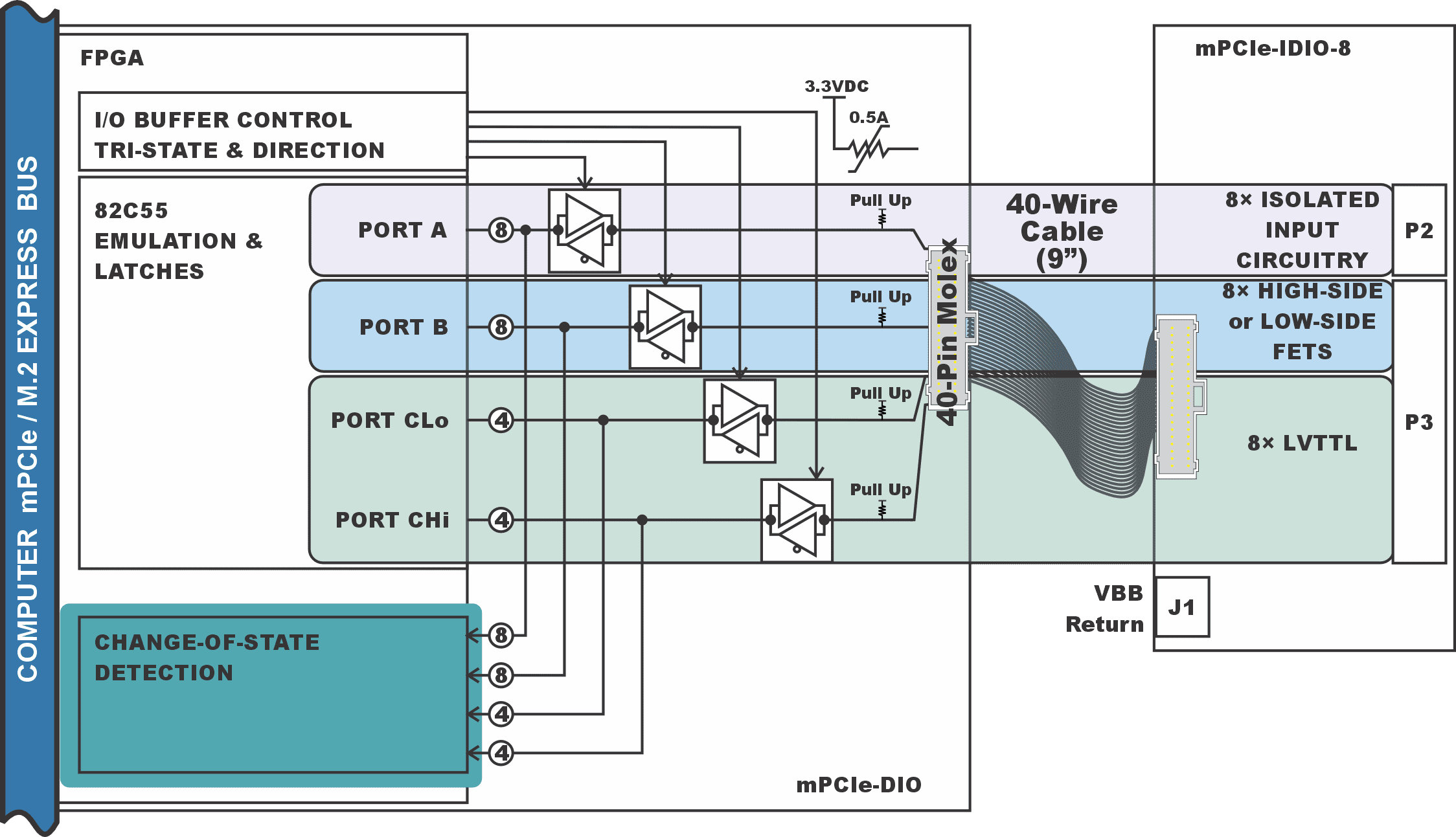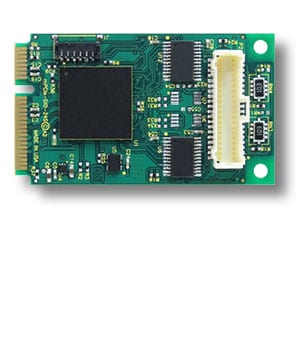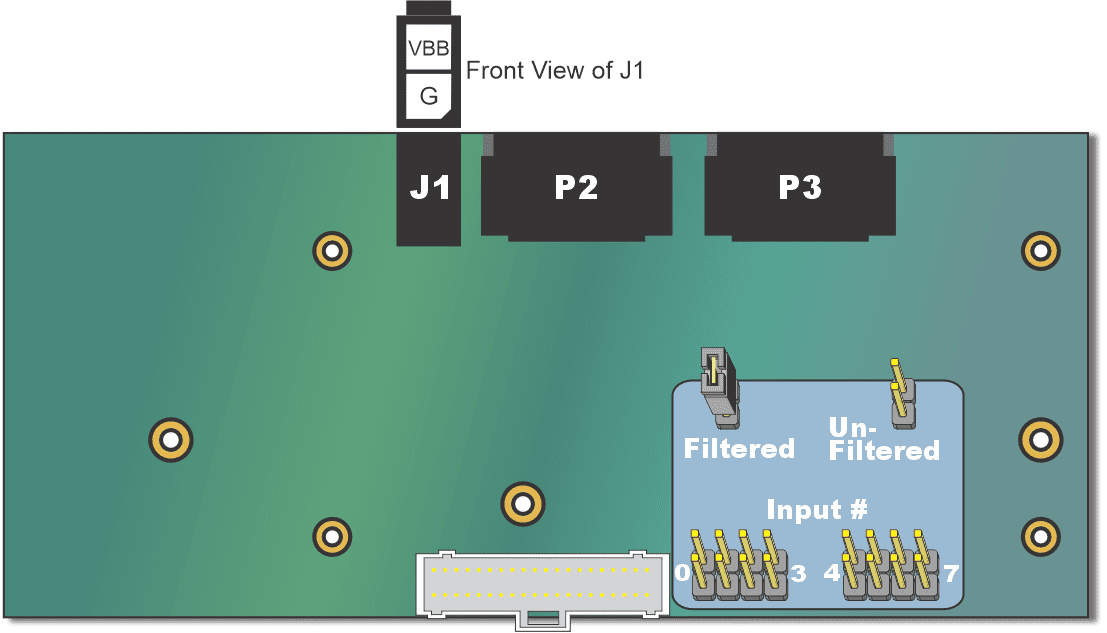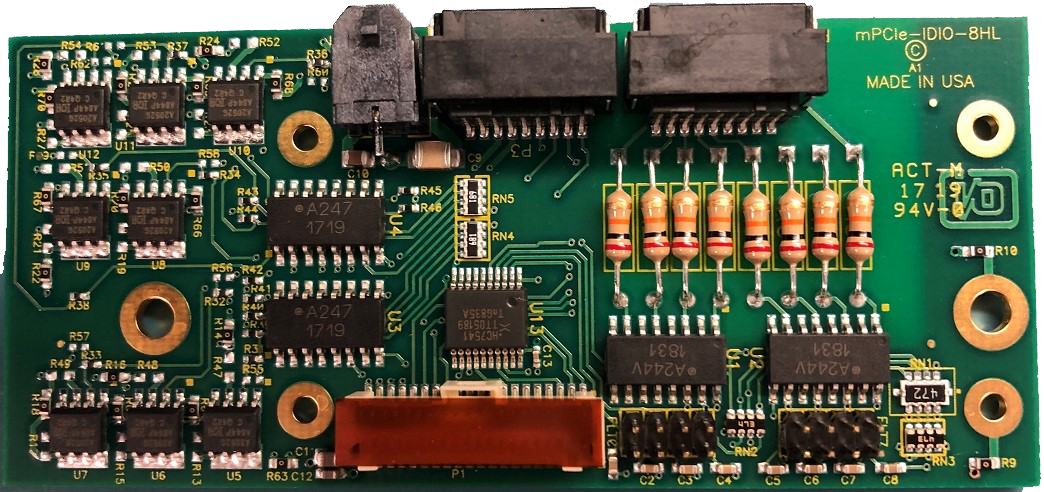mPCIe-IDIO-8HL Isolated Input Relay Output Card
Up to 8 High-side or Low-side Solid-State (FET) Outputs and Isolated Inputs
FEATURES
- mPCIe (PCI Express Mini Card) Type F1 and latching I/O connectors
- 8 or 4 optically-isolated non-polarized inputs up to 31VDC/AC
- 8 or 4 fully protected FET outputs
- Available as High-Side switch from 6 to 48 VDC at up to 1A
- or Low-Side switch from 5 to 48 VDC at up to 0.5A
- or half high-side and half low-side
- 8 LVTTL I/O lines programmable as inputs or outputs in groups of 4
- Change-of-State (COS) detection IRQ generation
- 9” cable (228MM), standard
- RoHS standard
- Available in M.2 form!
- Designed, made, supported, and manufactured in the USA
FACTORY OPTIONS
- Extended temperature operation (-40°C to +85°C)
- Support for Wind River VxWorks (call for ordering information)
Call
In StockDescription
mPCIe Card with 8 OR 4 Isolated Digital Inputs with Change-of-State (COS) Detection and Solid State FET Relay Outputs
The mPCIe-IDIO-8 consists of a “F1” PCI Express Mini Card interface board that connects to an Isolation Module via an included 9” cable. That module is designed to be easily panel-mounted in any application environment. It uses the high speed PCI Express bus to transfer digital data to and from the card. The digital I/O is compatible with 8255 PPI chips making it easy to program. This allows for simple and trouble-free migration from other ACCES PCI and PCI Express digital I/O cards, but also provides for advanced features enabled by the onboard FPGA logic.
The mPCIe-IDIO cards are well suited to complex environments, mitigating otherwise challenging ground-loops, high-common-mode, and transient voltage spikes common in electrically-noisy industrial or factory locations. The broad voltage compatibility allows use in a wide range of applications.
The non-polarized inputs support both AC and DC, and configuration jumpers allow 4.7ms input filters to be enabled per-channel, as desired – required for AC use. The isolated inputs support voltages from 12 to 48 VDC/VAC RMS [40Hz to 10000Hz], as well as standard 12/24 AC control transformer signals.
The “H” versions come with outputs that are fully protected High-Side Power MOSFETs capable of switching from 6 to 48VDC at up to 1A continuous-current load (board total of 7.5A max current allowed).
The “L” versions’ outputs are fully protected Low-Side Power MOSFETs switching 5 to 48 VDC at up to 0.5A
“HL” versions come with half high-side and half low-side FETs.
Change of State (COS) detection and interrupt capabilities are designed to relieve software from polling routines that can consume valuable processing time. Each port can be programmed for detecting state changes on their lines, in which any changes of the enabled port’s bits (low-to-high or high-to-low) will generate an IRQ. An ISR (interrupt service routine) then determines which bit changed state and clears the interrupt.
Digital∫Features
Digital∫Features (read as “Digital Integration Features”) are a new family of features available for applicable models of ACCES’ PCI Express (PCIe) and mPCIe (and M.2) Digital I/O product lines.
All the cards share features such as memory mapped registers for low-latency operation. Output channels support pulse/train / PWM / frequency / and quadrature generation. Inputs channels support flexible measurement of pulse duration, frequency, and event counting, with optional debouncing, IRQ generation, and more.
Applications
- Process Monitoring
- Manufacturing/Production Test
- Machine Control
- Monitoring and Control
- Security Systems, Energy Management
- Industrial Automation
- Factory Automation
- Laboratory Automation
- Embedded OEM
Special Order
Please contact ACCES with your precise requirement. Examples of special orders would be conformal coating, custom software or product labeling, and more. We will work with you to provide exactly what is required.
Accessories and Connections
Available accessories include a variety of screw terminal boards for quick and easy connectivity as well as mounting hardware. Alternately, custom hardware cables and/or interfaces can be produced to fit your specific application requirement.
SOFTWARE
The card is supported for use in most operating systems and includes a free DOS, Linux , and Windows compatible software package. This package contains sample programs and source code in C#, Delphi, and Visual C++ for Windows. Also provided is a graphical setup program in Windows. Linux support includes installation files and basic samples for programming from user level via an open source kernel driver. Third party support includes a Windows standard DLL interface usable from the most popular application programs, and includes LabVIEW VIs. Embedded OS support includes Windows XPe, WES7, WES8, vxWorks, etc. Full register-level documentation of all features ensures easy compatibility in any application environment.
Downloads
Data Sheets
Manuals
Software
- M.2- and mPCIe-IDIO-8 Family Software Package (Last Updated 2025-05-20)
Drivers and Downloads
Full list of available Downloads: Software Packages, Drivers, Manuals, and other documents
Information about our Free Software packages:
ACCES is proud to provide a full suite of software support with every Data Acquisition product. We are committed to supporting the most popular operating systems and platforms for our customers. Currently we are actively supporting 7 -> 11, both 32 & 64 bit, including “Server 2008,” “Embedded,” and “Compact” flavors for all plug-and-play products including PCI, PCI Express, USB, and more. Many products continue to ship with support for additional operating systems such as DOS, Windows 95, 98, Me, NT4, 2000, and XP.
Samples
Among the software we deliver with our products are sample programs in a wide variety of programming languages. These samples are used to demonstrate the software interfaces to our products — and many can be used as-is in your production environments, or to test functionality of the devices out-of-the-box. We’re currently actively supporting sample programs in Microsoft Visual C#, and Delphi, with many devices including samples in Visual Basic (5 and .NET), Visual C/C++, and Borland C/C++ 3.1 for DOS. Additionally we provide National Instruments LabVIEW compatible DLLs and many demonstration VIs for our devices.
Drivers
Drivers for various operating systems are also provided, including active support for Windows 7 -> 11 — all in both 32-bit and 64-bit flavors, and including consumer, server, and embedded varieties — as well as the 2.6 and newer Linux kernels and recent OSX / macOS versions. Many products continue to ship with driver support for Windows 95, 98, Me, NT4, Windows 2000, XP, and more, but support for these operating systems is considered deprecated.
Setup Programs and Utilities
Our Data Acquisition devices also include a graphical setup utility that walks you through the process of configuring any option jumpers or switches on the device, as well as explaining a little about the various connectors present.
Many devices also include utility programs – little tools to make your use of the device easier, such as EWriter, a program that allows you to read and write data in the user-accessible EEPROM locations on all our USB data acquisition products; or WinRISC, a “Really Incredibly Simple Communications” terminal program that lets you get started instantly with serial devices.
“Register Level” Documentation
Besides all this software in all these languages and operating systems ACCES has a policy of open and transparent development: none of our lowest-level “register” interfaces are hidden from you — we document every register in every bus card, every command in every serial board, and every usb control transfer in every USB Data Acquisition board. These lowest-level interfaces allow you to develop for our products in ANY operating system or language, regardless of our actively supporting it or having a driver for it. We have customers actively developing in ADA, Android, Python, Java, MATLAB, Solaris, and more, just by referring to our complete low-level interface documentation! And we provide the full source code to all of our drivers, regardless of operating system, to give you an even bigger head start in your own development tasks.
No Fees or Royalties
All of this software is provided at no additional charge, and is licensed under any of a variety of flexible — and royalty free — options. Check out our software license explanation if you’d like more information.
Custom Software
ACCES also offers Custom Software Services for our products. Our prices are unbelievably low, often as inexpensive as free! If you need something tweaked to support your needs, or an entire enterprise application developed from scratch, it is definitely worth your time to inquire with us, first.
Further information about available ACCES Software:
Redistributing Windows Drivers
A list of ACCES drivers and the files that compose them under different versions of Windows, so you can easily redistribute ACCES cards and drivers.
aioWDM.VxWorks
ACCES has successfully partnered with Wind River to bring our entire line of PCI and PCI Express DAQ cards to VxWorks 7!
VxWorks 7 VxBus Gen 2 drivers, with easy-to-use API-libraries, are available for this product, including full source and sample code.
Designed to be compatible with our AIOWDM.dll Windows driver & API, this kernel module adds zero% CPU-cycle overhead to your VxWorks runtimes while allowing the lowest-latency hardware register access possible.
You can find more information about our VxWorks libraries and services on our Wind River Silver Partner page.

PC Interface
- mPCIe Card, Type F1
Isolated Inputs
- Number: 8 (or 4)
- Type: Non-polarized, optically isolated from each other and from the computer (CMOS compatible)
- Voltage:
- Low: 0 to 8 V DC or AC RMS (40 to 10000Hz)
- High: 12 to 48 V DC or AC RMS (40 to 10000Hz)
- Isolation: 500V channel-to-ground and channel-to-channel
- Resistance: 1.8KΩ in series with opto-coupler
- Filter Response
- Rise-time: 4.7 ms
- Fall-time: 4.7 ms
- Non-Filter Response
- Rise-time: 10 μs
- Fall-time: 30 μs
FET Outputs
- Number: 8 (or 4)
- Type: Protected against short-circuit, over-temp, ESD; drives inductive loads.
- “H”: High Side Power MOSFET Switch 6 to 48 VDC (customer supplied).
- “L”: Low Side Power MOSFET Switch 5 to 48 VDC (customer supplied).
- Current Rating:
- “H”: 1A maximum
- “L”: 0.5A maximum
- Turn On time:
- “H”: 80μsec (typical)
- “L”: 1.3µsec (typical)
- Turn Off time:
- “H”: 80μsec (typical)
- “L”: 2.3µsec (typical)
Digital Inputs
- Number: 8 (selectable as Input or Output in I/O Groups of 4 bits)
- Type: LVTTL
- Logic High: 2.0V to VCCIO (3.3VDC, 5VDC tolerant)
- Logic Low: 0V to 0.8V
Digital Outputs
- Number: 8 (selectable as Input or Output in I/O Groups of 4 bits)
- Type: LVTTL
- Logic High: 2.0V (min) 24mA source
- Logic Low: 0.55V (max) 24mA sink
Environmental
- Temperature
- Operating: 0°C to 70°C (order -T option for industrial temperature -40°C to 85°C)
- Storage: -65°C to 150°C
- Humidity: 5% to 95%, non-condensing
- Power required: +3.3VDC @ 360ma (typical)
Physical
- mPCIe card characteristics
- Weight: 6.2 grams
- Size
- Length: 50.95mm (2.006″)
- Width: 30.00mm (1.181″)
- I/O connector
- On-card: Molex 501190-4017 40-pin latching
- Mating: Molex 501189-4010
- Isolation board characteristics
- Weight: 38.2 grams, (+11.2 grams for the 9″ cable)
- Size
- Length: 92mm (3.614″)
- Width: 41mm (1.614″)
- I/O connector
- On-card:
- P2 & P3 I/O Connectors: Molex 5054481871
- J1 Power Connector: Molex 0430450200
- Mating:
- P2 & P3: Molex 5054321801
- J1: Molex 430250200
- On-card:
Regulatory Compliance
- This product is designed to be in full compliance with CE requirements.
| Model | Description | Price (USD) | |
|---|---|---|---|
| mPCIe-IDIO-8HL | mPCIe, 8 Isolated Inputs, 4 High Side and 4 Low Side Wide Voltage Solid State Outputs | Call | |
| mPCIe-IDIO-8H | mPCIe, 8 Isolated Input and 8 Solid State Wide Voltage High Side Relay Outputs | Call | |
| mPCIe-IDIO-8L | mPCIe, 8 Isolated Inputs, 8 Low Side Solid State Relay Outputs | Call | |
| mPCIe-IDIO-4HL | mPCIe, 4 Isolated Inputs, 2 High Side and 2 Low Side Wide Voltage Solid State Outputs | Call | |
| mPCIe-IDIO-4H | mPCIe, 4 Isolated Input and 4 Solid State Wide Voltage High Side Relay Outputs | Call | |
| mPCIe-IDIO-4L | mPCIe, 4 Isolated Inputs, 4 Low Side Solid State Relay Outputs | Call | |
| mPCIe-IDO-8HL | mPCIe, 4 High Side and 4 Low Side Wide Voltage Solid State Outputs | Call | |
| mPCIe-IDO-8H | mPCIe, 8 Solid State High Side Wide Voltage Relay Outputs | Call | |
| mPCIe-IDO-8L | mPCIe, 8 Low-Side Solid State Relay Outputs | Call |
| mPCIe Card Mounting Hardware | |
|---|---|
| mPCIe-HDW-KIT2 | 2mm mounting hardware $1 |
| mPCIe-HDW-KIT2.5 | 2.5mm mounting hardware $1 |
| Model Options (call for pricing) | |
| -T | Extended temperature operation (-40° to +85°C) |



